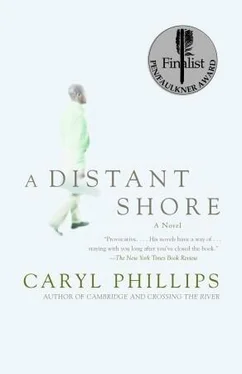“Morning, Amanda.” She knows that of all her pupils poor Amanda with the thick ankles will continue to pursue the cello, while others will soon abandon music for more worldly pleasures.
George and Samantha sit at a table by the side of the court. They have been arguing for most of the set, pulling the single colouring book first one way and then the next. Now George throws his crayon at his older sister, who retaliates, marking George across his cheek with an orange gash. Sally comes to the net.
“I’m sorry, but I’ll have to see to them.”
She watches as Sally talks firmly to her children. Tennis with Sally has proved to be something of a mixed blessing, for she still has problems with her hips, but she does enjoy the competition. After Brian left she tried golf, but that served only to reinscribe the loneliness. And mistakes had to be viewed purely in the light of individual incompetence. At least with tennis she can win the occasional point off her opponent’s mistakes. Like life itself. A distraught-looking Sally wanders back to the net.
“I’m sorry, but I think we should stop now. Maybe five-all is as good a place as any.” She decides to say nothing, but privately wonders what on earth made Sally imagine that a four-year-old and a six-year-old would sit patiently while their mother hit a ball back and forth across a net.
The children seem happier in the cafeteria, pulling joyfully on their straws and slurping Coca-Cola all over their faces and clothes. She drinks an orange juice while Sally sits with a cup of tea and analyses the game.
“You’re getting stronger all the time. I think you’re a bit of a natural.”
She graciously accepts the younger woman’s compliments. However, if it was not for Sally she would not be here. There is nobody else that she knows in the leisure centre, and she has no desire to join up. The woman on the front desk has twice told her that she is losing money doing it this way, and that it would be much cheaper to become a member, but she prefers her temporary arrangement. Sally glances at the two children, who continue to enjoy their newly harmonious, if messy, friendship. Then she looks back at her older companion.
“Tongues are wagging in the staffroom.”
She stares blankly at her, but in a manner that forces Sally to continue.
“It’s just that I know you’ve never been much of a mixer, but these days you seem to keep yourself to yourself. As if you’re too grand for everybody, but I know that’s not how you really feel. It’s just what some people are saying.”
Through the glass, and down on the court below them, she can see two men furiously thrashing a ball back and forth with little concern for finesse. Theirs is a game of brute strength and endurance. She turns to look at Sally. The younger woman’s face is calm and etched with concern, but she resents her younger colleague’s words. Warning? Admonishment? It matters little. The words are inappropriate and she will not play tennis with this woman again.
Geoff seems slightly less animated than he was at the restaurant. Wine, she thinks. More wine, and she pours him another glass and makes a point of leaving the bottle uncorked. This morning, she slipped a note in Sally’s pigeonhole cancelling next week’s tennis. She gave no reason. Then she found the hastily scribbled note from Geoff. “Dinner? Tonight?” She put the note up against the wall and under his double question she scrawled, “My place, 8 p.m.” Then she wrote down her address, folded the note twice and tucked it into his box. She had hoped for a note from him on the morning after their dinner, but better late than never, she thought. And now, as he sips at his new glass of wine, he finally explains his failure to write.
“Claire hurt herself at school, but my wife made it sound as though the child was going to have a leg amputated. But when I got there we argued, of course. I missed the whole of yesterday, and I didn’t get back till one o’clock this morning.”
“I’m sorry.”
He empties his glass in one and pours himself another glass. Again he praises the food, but she knows that there is nothing to praise about tuna casserole. It is nice of him, but not necessary. They move into the living room and he reclines back into the sofa. She takes the armchair and sits opposite him, and then he points to the gilt-framed photograph on top of the piano.
“Your parents?” She nods.
“They were born in this town, and they lived and died here. They’re both buried in the local cemetery, side by side.” He sits forward now.
“How do you feel about that?”
About what? she wonders. About parents who had neither the means nor, in the case of her father, the desire to escape their working-class lives? Who never recovered from the shock of their eldest child going off to university in another town? Who resented their youngest child for having the temerity to abandon them and go and seek her fortune in London among the lights? How did she feel? She didn’t feel that she owed them anything, but she couldn’t deny that she had come running home when her own life had collapsed. She had, in essence, returned to their world, albeit with council houses sold off, Indians controlling the local economy, and new town houses that cost six figures for those who worked in the technology sector. Were her parents to step from their graves and re-enter this world, theirs would no longer be a town that they would recognise. She looks at her guest, and then she returns her gaze to the photograph of her parents. What she cannot tell this man is the degree to which she despises that which has been bequeathed to her. The genetic stain. Cowardice.
It is late. A kiss hangs in the air, but he seems incapable of leaning over and taking it.
“I think I’d better go now, before Mrs. Johnson slams and bolts the door on me.” He stands. They have talked about music. They have talked about travel, and about how he loved to ride the trains on Inter-rail both during and after college. Every summer he did this, skipping from Germany to France, from France to Holland and so on, moving around as the mood took him. Geoff Waverley had experienced many adventures on the road, though none, as far as she could tell, of the amorous variety. She hears the words before she has time to sort and arrange them.
“You don’t have to go. You’re more than welcome to stay here.” Her eyes light upon the clock on the mantelpiece. Again she speaks. “It’s still reasonably early.” He is standing by himself, marooned. She feels uncomfortable leaving him in this position and so she too stands. She faces him, but it is he who reaches out and takes her hand.
“I don’t think we should be doing this.”
“Doing what?” she asks.
They lie side by side. She stares at the ceiling, but his eyes are closed. She lied about her age when he complimented her.
“Fifty,” she said. “Is that too old?”
He laughed in a manner that let her know that her question was absurd. And then he fell silent and closed his eyes, while she stared at the ceiling. She can feel the surge of guilt begin to course through his stiffening body. She considers putting on some music, or opening another bottle of wine so that they can both have a drink. However, she knows that to leave the bed will break the spell. Sharing his body is one thing. Sharing his thoughts is clearly another thing altogether. And then he rolls over onto his shoulder and he faces her.
“I’ve got to go.” Her eyes meet his and she nods. “My head,” he says. “It’s spinning and I’ll just keep you awake all night.”
“I understand.” She strokes his face. “I had a good time. Thank you.” He smiles and then in one movement he rolls away from her and sits on the edge of the bed. She turns her back on him to give him some privacy, and she stares at the blank wall.
Читать дальше











![Карен Кингсбери - A Distant Shore [calibre]](/books/384306/karen-kingsberi-a-distant-shore-calibre-thumb.webp)
